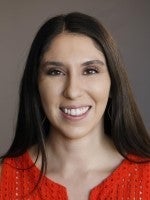
Law and Sustainability
Nationally ranked #17 in environmental law
Since the dawn of the Industrial Age, rapid advancements in technology have dramatically improved daily life for billions of people across the world. Unfortunately, many modern conveniences also deplete or harm the planet’s natural resources in unsustainable ways. Transitioning cities, nations, and the world toward more environmentally sustainable activities has thus emerged as one of humankind’s greatest 21st-century challenges, and innovative lawmaking has a crucial role to play in this effort. The program in law and sustainability at the Sandra Day O'Connor College of Law at Arizona State University provides world-class instruction and meaningful research experiences that equip students with the knowledge and skills necessary to become influential leaders in the global sustainability movement. The program’s renowned faculty research and teach in every major area of sustainability policy, including climate change, water, energy, and environmental protection. Students within the program have access to a range of externships, research opportunities, moot court experiences, and mentorships available in few other law schools across the globe.
Benefits
ASU Law students with a particular interest in environmental sustainability law and policy can access countless benefits through ASU’s law and sustainability program, which prepares students to secure legal jobs in sustainability-related fields and to become influential leaders in those positions. All students at ASU Law have access to the program’s diverse array of environmental and sustainability-related course offerings including water, energy, natural resources, utilities, land use, and international environmental law. All students can also take advantage of numerous opportunities to further specialize in and to gain sustainability-related experience outside the classroom.
Degree programs
Student opportunities
ASU’s Law and Sustainability Program provides exceptional opportunities for students to engage with the environmental sustainability community, build their resumes, and gain practical experience to prepare them to practice in sustainability-related fields. Each year, students have opportunities to network one-on-one with attorneys through the Mentorship Initiative in Sustainability Law (MISL), publish research articles as Sustainability Law Research Fellows, and gain practical experience through the Program’s extensive externship network.
Sample coursework offered:
- Advanced Environmental Law Topics
- Agricultural Law
- Energy Law and Policy
- Environmental Law
- Federal Indian Law II
- Indian Energy Law
- International Environmental Law
- Land Use Planning
- Land Use Proceedings
- Natural Resources Law
- Sustainability Law Research Seminar
- Sustainability: International Law and Governance
- Utilities Law
- Water Law
- Wilderness Law and Policy
Conference and prizes
SRP Sustainability Conference of American Legal Educators
The SRP Sustainability Conference of American Legal Educators is a large annual gathering of law professors who are researching in sustainability-related areas. The conference features presentations of legal academic research on subjects pertaining to environmental sustainability and law, including but not limited to topics in climate change law, environmental law, energy law, water law, natural resources law, land use and zoning law, agricultural and food law, and disaster law.
The ninth annual conference was held on May 9-10, 2024, at the Beus Center for Law and Society in Phoenix, Arizona.
Learn more about the conference
Partners and donors
The Law and Sustainability Program wishes to express its deepest gratitude to the following entities and individuals whose financial support is instrumental in the Program’s continued success.
Advisory Council
Founded in 2016, the Council for Law and Sustainability Studies (CLASS) is a selective board of Phoenix-area attorneys who practice in environmental sustainability-related fields of law. CLASS members provide guidance, connections, and assistance to the Program. ASU expresses deep appreciation to the following attorneys who currently serve on this distinguished council:
- John A. Clifford (Merchant & Gould)
- Monique Coady (City of Phoenix)
- Michelle De Blasi (Fennemore Craig, PC)
- Grady Gammage (Gammage & Burnham PLC)
- Barbara Pashkowski (Gust Rosenfeld P.L.C.)
- Sarah Porter (Morrison Institute for Public Policy)
- Mark McGinnis (Salmon, Lewis & Weldon, PLC)
- Todd Weaver (Freeport McMoRan)
- Kenneth J. Lee (Salt River Project)
Research fellows
Sustainability Law Student Research Fellowships give students opportunities to research and write professional, publication-quality articles on current legal and policy topics related to environmental sustainability. Research Fellows research and write a full-length law review articles, receiving and responding to at least 10 iterations of substantive feedback over eight months. Fellows also workshop each other’s research projects and deliver formal presentations of their articles to the law school community.
Since its inception, all 15 student-authored papers produced through the Research Fellows Program have received offers for publication in non-ASU legal academic journals.
- Connie Que & Jackson Pittman, Fertile Ground: Accelerating the Growth of Precision Fertilizing, DRAKE JOURNAL OF AGRICULTURAL LAW (forthcoming, 2024)
- Kyra Haas & Natalie Heun, End Game: Designing Smarter Wind and Solar Decommissioning Requirements, COLORADO ENVIRONMENTAL LAW JOURNAL (forthcoming, 2024)
- Kiara Sims & Kate Hamman, Real Estate Recycling: Supporting Office-to-Residential Conversions, FLORIDA JOURNAL OF LAW & PUBLIC POLICY (forthcoming, 2024)
- Taylor Stonerock & Julia Weiss, Pipe Dream: Rethinking CO2 Pipeline Subsidies, UC LAW ENVIRONMENTAL JOURNAL (forthcoming, 2024)
- Mallory Moore & Lena Zeebuyth, Missing Middle Housing: Accelerating America’s Transition from Single-Family Zoning, 64 Natural Res. J. 63 (2024)
- Kayna Lantz & Luke Sower, Fueling a Hydrogen Boom: Federal and State Policies for Promoting Green Hydrogen, 48 William & Mary Env’t L. & Pol’y Rev. 95 (2024)
- Benjamin Timm & Alejandro Chavez, Shutting Off the Tap: Structuring Buy and Dry Programs for the Western Water Crisis, 60 Cal. W. L. Rev. 71 (2024)
- Emily Doerfler & Cameron Toering, Stranded Costs and Double Standards: The Case Against Abrupt Changes to Net Metering Programs, 12 LSU J. of Energy Law & Res. 153 (2024)
- Alexandra Gordon & Benjamin Longbottom, Beyond All Drought: Improving Urban Water Conservation in the West through Integrative Water and Land Use Policy, NATURAL RESOURCES JOURNAL (forthcoming 2023)
- Sierra Apillanes & Alexa Penalosa, Unleashing Carbon Removal Technologies, COLORADO ENVIRONMENTAL LAW JOURNAL (forthcoming 2023)
- Sarah Brunswick & Danika Marzillier, The New Solar Farms: Growing a Fertile Policy Environment for Agrivoltaics, MINNESOTA JOURNAL OF LAW, SCIENCE, & TECHNOLOGY (forthcoming 2023)
- Vinnie Amato & Isaac Kort-Meade, Circle of Light: Incentivizing Domestic Solar Panel Recycling, UNIVERSITY OF LOUISVILLE JOURNAL OF ANIMAL AND ENVIRONMENTAL LAW (forthcoming 2022)
- Teddy Gonzalez & Jillian Knox, In the Dark: Combatting the Scapegoating of Renewables after Grid Failures, NATURAL RESOURCES JOURNAL (Forthcoming 2023)
- Nicole Layton & Ginger Sprong, Cut and Run: Bonding, Bankruptcies, and the Orphaned Oil Well Crisis, 10 LSU JOURNAL OF ENERGY LAW & RESOURCES (forthcoming 2022)
- Robert Bullington and Collin Wilfong, Charging Forward: Accelerating Long-Term Energy Storage Development, 23 VERMONT JOURNAL OF ENVIRONMENTAL LAW 156 (2022)
- Nathan Frischkorn and Samuel Waxman, Power and Pollution: Approaching Coal-Fired Power Plants and Renewable Energy through a Racial Justice Lens, 10 CHICAGO-KENT JOURNAL OF ENVIRONMENTAL & ENERGY LAW 1 (2021)
- Cory R. Bernard & Anthony C. Proano, Too Hot to Handle: Curbing Mobile Home Heat Deaths in a Warming Climate, 12 WASHINGTON JOURNAL OF SOCIAL & ENVIRONMENTAL JUSTICE 1 (2022)
- Nicholas Kandas & Alec Tyra, To Damn or Not Damn a Dam: Stakeholder Collaboration as a Tool for Dam Management, 46 WILLIAM & MARY ENVIRONMENTAL LAW & POLICY REVIEW 71 (2021)
- Christina Jovanovic, Precious and Few: Solving Renewable Energy’s Critical Minerals Problem, 9 LSU JOURNAL OF ENERGY LAW & RESOURCES 21 (2021)
- Megan Manning & Stephanie Deskins, Making It Usable Again: Reviving the Nation’s Domestic Recycling Industry, 50 GOLDEN GATE UNIVERSITY LAW REVIEW 107 (2020)
- Becky Robbins, A Growing Need: Crafting Urban and Agricultural Reforestation Policies to Fight Climate Change, 22 VERMONT JOURNAL OF ENVIRONMENTAL LAW 69 (2021)
- Ryan Murphy & Bryan Hull, Electrifying: Facilitating the Transition to Electric Lawn and Garden Equipment, 13 KENTUCKY JOURNAL OF EQUINE, AGRICULTURE & NATURAL RESOURCES LAW 2 (2021)
- Christine Chai & Andrew Mui, Lasting Protection: Equipping Federal Toxics Regulations for the Long Haul, 22 VERMONT JOURNAL OF ENVIRONMENTAL LAW 40 (2021)
- Rachel Richman & Cadmus Wang, Too Open for Business: Strengthening Long-Term Protections for Federal Public Lands, IDAHO LAW REVIEW (forthcoming, 2020)
- Daniel Stratman & Zalman Stern-Sapad, The Waivering Renewable Fuel Standard and How to Fix It, VERMONT JOURNAL OF ENVIRONMENTAL LAW (forthcoming, 2020)
- Jennifer Carstens & Dakota Freeze, Driving Change: A Route to More Sensible Vehicle Emissions, Regulation, VERMONT JOURNAL OF ENVIRONMENTAL LAW (forthcoming, 2020)
- Isaac Hall & Anthony Nordman, Up in Flames: Containing Wildfire Liability for Utilities in the West, TULANE ENVIRONMENTAL LAW REVIEW (forthcoming, 2020)
- Elizabeth Beatty & Abbey Hawthorne, Empowered: Bringing Energy Efficiency into Low-Income Homes, OIL AND GAS, NATURAL RESOURCES, AND ENERGY JOURNAL (Oklahoma) (forthcoming, 2020)
- Casey Ball & Courtney Moran, Structuring Better Caps for Sustainability Incentive Programs, IDAHO LAW REVIEW (2018)
- Ben Bryce & Robert Skousen, Bloomin’ Disaster: Externalities, Commons Tragedies, and the Algal Bloom Problem, UNIVERSITY OF DENVER WATER LAW REVIEW (2018)
- Eden Cohen & Ryan Hogan, Made in the Shade: Promoting Solar Over Water Projects, IDAHO LAW REVIEW (2018)
- Alexandra Evans & Robin Nagele, A Lot to Digest: Advancing Food Waste Policy in the United States, NATURAL RESOURCES JOURNAL (2018)
- Ashley Hardy & Dontan Hart, Policy Meltdown: How Climate Change is Driving Excessive Nuclear Energy Investment, BUFFALO ENVIRONMENTAL LAW JOURNAL (2018)
- Casey Ball & Courtney Moran, Penny Lane, Literally: Funding Roads One Vehicle Mile at a Time, 5 WILLAMETTE ENVIRONMENTAL LAW REVIEW 1 (2016)
- Lindsay Breslau, Mike Croweak, & Alan Witt, Batteries Included, Incentivizing Battery Storage, 17 AMERICAN UNIVERSITY SUSTAINABLE DEVELOPMENT LAW AND POLICY BRIEF
- Casey Clowes, Tessa Hustead, and Daniel Kolomitz, Thirsty for a Solution: Promoting More Efficient Water Use in the West, 20 University of Denver Water Law Review 65 (2016)
- Daniel Schwiebert & Shane Urban, Trickle-Down Solar: Which Strategies for Expanding Access to Solar Energy Make the Most Cents?, 6 ARIZONA PRACT. LEG. J. 91 (2016)
- Racheal White Hawk, Community-Scale Solar: Watt’s In It for Indian Country?, 40 ENVIRONS ENVIRONMENTAL LAW AND POLICY JOURNAL 1 (UC Davis) (2016)
Morrison Prize Contest
The Morrison Prize is a $10,000 award presented to the author(s) of the most impactful sustainability-related legal academic paper published in North America during the previous year. All entries undergo independent review and scoring by a group of professors not affiliated with ASU who teach in environmental sustainability-related areas at various North American law schools. The scores from these judges are aggregated to determine the prize winner. The prize winner(s) present their paper in a plenary session at that year’s conference.

Cory Bernard
J.D. Candidate / Class of 2021
My time as a Sustainability Law Student Research Fellow was one of my most rewarding as a law student. The seminar exposed me to many critical legal issues, and helped me build relationships with peers who share my passion for the environment. The professors and practitioners associated with the program also share this passion, and their guidance helps any student participating in ASU’s many environmental law offerings to prepare for a future in the field.

Alexa Penalosa
J.D. Candidate / Class of 2022
ASU's Law and Sustainability Program has far surpassed my expectations - from the remarkable faculty, the engaged alumni, and my fellow classmates - everyone involved is passionate about learning and helping one another succeed. The Program offers students such an amazing list of classes to choose from, taught by legal scholars and experts who are actively writing, working, and blazing the trail in these evolving legal fields. The classes they teach not only prepare us to be well versed in the foundational aspects of the law, but the professors further prepare us to understand the evolving legal landscape in these fields. Even more importantly, the professors and classes challenge us to be the best lawyers we can be - pushing us to study new and evolving legal theories, strengthen our research and writing skills, and practice our legal advocacy abilities. This Program not only sets up students to be well prepared to enter the environmental law and sustainability field, but it prepares students to be the best, well-rounded professionals we can be.

Michelle Stinson
J.D. Candidate / Class of 2021
Pursuing the Law and Sustainability Certificate during my time at ASU College of Law allowed me to go beyond simply learning the current landscape of environmental law. Our professors at ASU are leading experts in their fields, and they always encourage us to consider how we too can be leaders in bringing about necessary changes to meet our world's current environmental challenges. Whether it's tackling climate change, biodiversity loss, water shortages, or the transition to clean energy, I know my education has prepared me to contribute to building a more sustainable future.
Law and Sustainability Expertise
The Program on Law and Sustainability’s outstanding collection of tenured research faculty sets it apart as one of the strongest sustainability-focused environmental law programs in the country. Program faculty members also collaborate on research and other activities with ASU’s Center for Law and Global Affairs, Center for Law, Science and Innovation, Indian Legal Program, Global Institute of Sustainability, and Kyl Center for Water Policy at the Morrison Institute for Public Policy.
Troy Rule
Faculty Director - Renewable Energy Law
Kenneth Abbott
International Environmental Law
Daniel Bodansky
International Environmental Law
Karen Bradshaw
Environmental and Natural Resources Law
Andrew Carter
Wilderness Law
Rhett Larson
Water Law
Robert Miller
Resource Governance on Indian Trust Lands
Erin Scharff
Associate Professor of Law